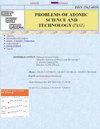COSMIC RAY SOURCE AND SOLAR ENERGETIC PARTICLES
IF 0.6
Q4 PHYSICS, NUCLEAR
引用次数: 0
Abstract
The acceleration of particles to the high energy is one of the key issues of solar physics, cis-lunar irradiations, astrophysics, and astroparticle physics. With the development of space astronomy, people started to realize that plasma disturbances in solar flares, Earth’s magnetosphere, and interplanetary space can also produce a large population of non-thermal particles. Cosmic ray promotion i.e. selective energization of matter in the cosmos requires, as on earth, three distinct stages: ionization, injection and acceleration to high energy. Supernova remnants and stellar winds of massive stars grouped in associations appear to be excellent celestial accelerators or re-accelerators through the shock waves they induce in their superbubbles. The injection of ions seems devoted to stars, except the smaller ones. In cosmic several mechanisms lead charged particle acceleration. Electrons are accelerated in direction of Earth’s poles by long train of electric double layers of small amplitudes. Charged particles are accelerated by the pondermotive force of electromagnetic radiation. Also, in a nonequilibrium current plasma or a plasma with particle flows, a strong electric double layer can be formed, which accelerates charged particles to high energies. The reconnection of the magnetic field lines also leads to the acceleration of charged particles.宇宙射线源和太阳高能粒子
粒子向高能的加速是太阳物理学、顺月辐射、天体物理学和天体粒子物理学的关键问题之一。随着空间天文学的发展,人们开始意识到太阳耀斑、地球磁层和行星际空间中的等离子体扰动也可以产生大量的非热粒子。宇宙射线的促进,即宇宙中物质的选择性通电,需要三个不同的阶段:电离,注入和加速到高能。超新星残骸和聚集在一起的大质量恒星的恒星风似乎是极好的天体加速器或再加速器,因为它们在其超级气泡中诱发了冲击波。离子的注入似乎只针对恒星,除了较小的恒星。在宇宙中有几种机制导致带电粒子加速。电子沿着地球两极的方向被一长串振幅小的双层电层加速。带电粒子被电磁辐射的重动力加速。此外,在非平衡电流等离子体或有粒子流的等离子体中,可以形成强双电层,使带电粒子加速到高能量。磁力线的重新连接也会导致带电粒子的加速。
本文章由计算机程序翻译,如有差异,请以英文原文为准。
求助全文
约1分钟内获得全文
求助全文
来源期刊
CiteScore
0.70
自引率
50.00%
发文量
0
审稿时长
2-4 weeks
期刊介绍:
The journal covers the following topics:
Physics of Radiation Effects and Radiation Materials Science;
Nuclear Physics Investigations;
Plasma Physics;
Vacuum, Pure Materials and Superconductors;
Plasma Electronics and New Methods of Acceleration.

 求助内容:
求助内容: 应助结果提醒方式:
应助结果提醒方式:


